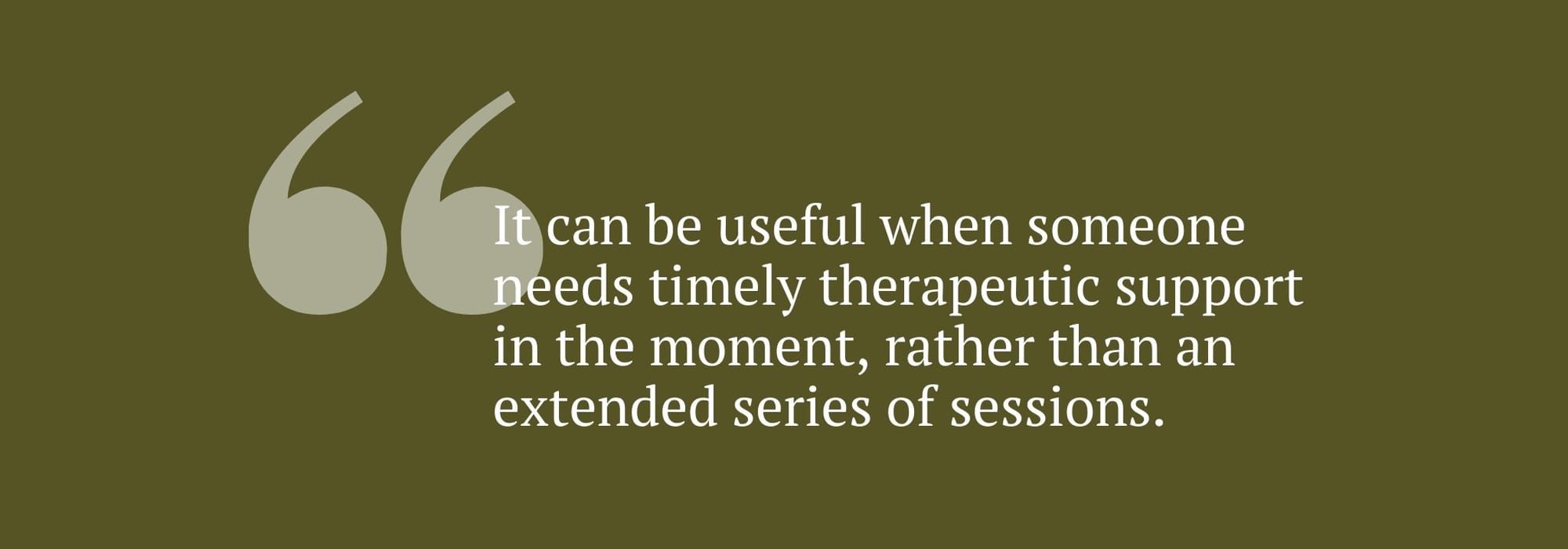The average therapy session lasts around 50 minutes, but what if you could cut that down to just 15? We ask three experts how micro therapy works…
Therapy is an invaluable way to understand yourself, explore personal issues, and work towards positive change, but there’s no denying that sessions can be time-consuming and costly.
As an alternative, some people are opting to try ‘micro therapy’ – a shorter form of therapy. Instead of typical sessions that last up to an hour, these last around 15 minutes.
“Micro therapy is solution-focused,” says psychotherapist Annabelle Hird. “It may take place in a conversation, or via a messaging service. A client will bring a specific issue, and will get emotional support and coping skills around a particular issue.”
While it doesn’t replace traditional therapy, micro therapy can be helpful to address immediate concerns, emotional check-ins, or share actionable tools for wellbeing. It can also be useful for clients who are strapped for time or money, which can be barriers to longer sessions.
Quick solutions for small problems
“Anything that feels like a huge obstacle to you living your life as you wish to, is better taken to long-term counselling,” says Annabelle. “But bumps in the road could easily be explored in micro therapy. For example, anxiety over presenting a piece of work, or social anxiety around a particular event.”
Depending on your needs, micro therapy can use a number of different therapeutic modalities, including:
-
Solution-focused brief therapy – focusing on finding solutions and building resilience.
-
Cognitive behavioural therapy – identifying and reshaping unhelpful thoughts.
-
Coaching psychology and motivational interviewing approaches – working on motivation, goal setting, focus, or performance.
-
Mindfulness – for stress and emotional regulation.
-
Somatic or nervous system-informed techniques – for immediate grounding and emotional regulation.
So how can you try micro therapy, and what should you consider beforehand?
Be laser-focused
Dr Katie Barge, a chartered psychologist, says micro therapy is mostly suited to shorter-term issues, such as managing day-to-day stress. “It can be useful for quick check-ins during periods of change or uncertainty, such as a career change,” she says.
Because sessions can provide calming techniques, you may want to focus on an issue causing you stress. This could be anything from having a difficult conversation with your boss to making a decision about moving to a new city.
However, Annabelle adds, there is little room for client-led work or talking at length in short sessions.

Consider your time and finances
Hendrix Hammond, a UK Council for Psychotherapy registered psychotherapist, says short sessions can be less daunting, and provide an easier way into counselling. “It can be useful when someone needs timely therapeutic support in the moment, rather than an extended series of sessions,” he says.
For that reason, if you’re short on time and money, micro therapy may be the most accessible way for you to get the support you need.
Downsides of micro therapy
Not all therapists will offer shorter sessions – and they don’t suit every client either. “If you’re neurodiverse, or someone who needs more time to reflect, process, or engage with emotional depth, this style of working may not be the most supportive or effective for you,” says Hendrix.
“The main limitations are depth, and the establishment of safety, which is cultivated over time,” says Dr Barge. “Micro therapy is not designed or equipped to explore complex trauma, in-depth relational patterns, or deeply-rooted mental health conditions.”
Without the time to explore issues deeply, there is a risk of oversimplifying issues or offering surface-level solutions. “There’s also the potential for emotional material to be opened up without time to contain or process it, which could leave some clients feeling vulnerable,” adds Dr Barge.
However, it can be helpful for those already in therapy. “Once a client has established a relationship with a practitioner, and has a greater understanding of themselves, then micro therapy could be a good way to check-in and get support to use their learning to resolve issues as they arise,” says Annabelle.
Don’t forget the big picture
“If issues feel chronic, overwhelming, and/or are rooted in past trauma or attachment, longer sessions are essential,” says Dr Barge. “You should consider regular therapy if your symptoms are persistent or worsening, you feel stuck in repeating patterns, you’ve experienced loss or trauma, or you need a safe, consistent space to explore complex emotions.”
Ultimately, micro therapy offers a quick, accessible way to address specific, short-term issues, making it ideal for those with limited time or budget. Although it’s not a replacement for traditional therapy, it can be a handy tool for emotional check-ins and practical support.


Comments